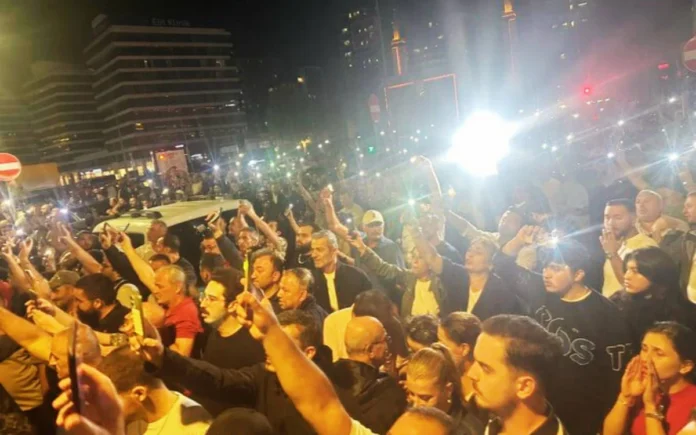Turkey’s media regulator issued a stern warning to pro-opposition broadcasters, threatening severe penalties, including license revocations, after police clashed with demonstrators outside main opposition Republican People’s Party (CHP) headquarters in Istanbul on Sunday,Turkish media reported.
Ebubekir Şahin, head of the Radio and Television Supreme Council (RTÜK), posted a statement on X, insisting that broadcasters abide by media regulations and refrain from airing content that could incite unrest or provoke violence.
He cautioned that any violations would prompt “all necessary sanctions, including license cancellation.”
Press freedom advocates and media unions condemned Şahin’s statement, accusing him of intimidating broadcasters. HABER-SEN, a journalists union, said on X that Şahin had no authority to pre-emptively threaten media outlets and was violating Turkey’s own broadcasting law.
“RTÜK’s president is waving a stick at the media,” the group said in a statement. “He has no legal authority to threaten broadcasters in advance, and this limits press freedom and the public’s right to information. We call on Şahin to respect Law No. 6112, which explicitly prohibits prior interference in broadcasts.”
The union also accused Şahin of unlawful interference in March, when several live broadcasts of opposition protests were cut off.
The threat by Şahin is part of a pattern of systematic censorship of opposition media, with other networks — including TELE 1, NOW TV, Halk TV and Sözcü TV — also facing bans and fines for their coverage of politically sensitive issues.
It is common for pro-opposition news channels in Turkey to face restrictions on their broadcasting through sanctions imposed by RTÜK, whose board members are appointed in proportion to the number of seats held by political parties in parliament, meaning that the ruling Justice and Development Party (AKP) currently dominates the agency.
The confrontations were triggered by a controversial court ruling that annulled the CHP’s 2023 Istanbul provincial congress on procedural grounds, dismissing the local leadership — including chair Özgür Celik—and appointing an interim committee instead. The CHP decried the decision as politically motivated. In response, CHP supporters heeded a call to rally outside the party’s Istanbul headquarters in protest.
CHP leader Özgür Özel has denounced the court’s decisions as part of an authoritarian maneuver to neutralize opposition forces through the judiciary, warning of sweeping legal and civil resistance, including mass protests and lawsuits.
Authorities preemptively imposed a three-day ban on public gatherings in central Istanbul and deployed police barricades to seal off the CHP office. Clashes erupted when demonstrators attempted to reach the building, with tensions escalating into confrontations with law enforcement.
Since late 2024, more than 500 people linked to the party or the İstanbul Municipality have been detained or arrested on a range of charges, from terrorism to bid rigging, in what critics say is a systematic crackdown.
Among them are 14 CHP mayors, including Istanbul Mayor Ekrem İmamoğlu, who was also suspended from office.
İmamoğlu was detained on March 19 and later arrested on corruption charges criticized as politically motivated. His arrest, widely seen as targeting the biggest political rival to longtime President Recep Tayyip Erdoğan in the 2028 presidential election, sparked Turkey’s worst protests in decades.
İmamoğlu, who faces multiple investigations, has been sentenced to two prison terms, including one for allegedly insulting a public prosecutor. Both sentences are under appeal, but opposition leaders claim the charges are politically motivated.
The party and its supporters say the operations targeting the CHP are designed to neutralize elected officials and sideline opposition leaders after the party’s gains in the March 2024 local elections.
International human rights groups and lawmakers in Europe have raised concerns over the rule of law in Turkey, warning that the mass detentions and legal pressures could further erode democratic norms. The Marmara Prison in Silivri, where many opposition figures, including İmamoğlu, are being held, has become a symbol of the country’s deepening political tensions.
RTÜK handed down 46 sanctions in the first half of 2025 alone, 42 of them against critical outlets, with fines totaling nearly 100 million lira (about 2 million euros), according to the MFRR.
Turkey, which has been suffering from a poor record of freedom of the press for years, ranks 159th among 180 countries in the Reporters Without Borders (RSF) 2025 World Press Freedom Index.















